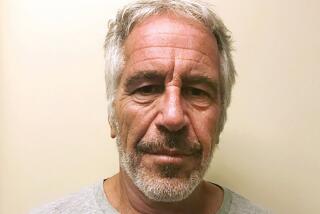Federal Official Killed During Inquiry 24 Years Ago : Estes Investigator’s Death Ruled Murder
AUSTIN, Tex. — A judge ruled Tuesday that a federal official killed by five rifle shots 24 years ago when investigating Billie Sol Estes, who later was convicted of a massive swindle, did not commit suicide but was murdered.
Estes told a grand jury last year that then-Vice President Lyndon B. Johnson had ordered the Agriculture Department official killed to prevent him from exposing Estes’ fraudulent business dealings and his ties with Johnson. The official, Henry Marshall, was investigating Estes’ cotton allotments at the time of his death.
State District Judge Peter Lowry ruled Tuesday that it was “clear and convincing” that the 1961 death of Marshall was not self-inflicted and ordered Marshall’s death certificate changed. His ruling involved only the cause of death, and Estes’ charges about Johnson’s involvement were not part of the hearing.
Associates of Johnson say that Estes has exaggerated his ties to Johnson, who became President in 1963, and the prosecutor who conducted the grand jury investigation last year said that there was no corroboration of Estes’ charges.
Marshall’s widow, Sybil Marshall, had tears welling in her eyes and was unable to comment after the verdict, reached after a 1 1/2-day hearing sought by the family.
“I am very happy,” said his son, Don Marshall, a school official in the Houston area.
“All we want is to correct the public record for our children and grandchildren,” Phil Banks, lawyer for the Marshalls, said. “We are not asking any insurance or any damages or that anybody be sent to jail.”
Marshall was found dead in a central Texas cotton field with five .22-caliber rifle wounds in his side, a cut on his head and a 15% concentration of carbon monoxide in his lungs. A local justice of the peace ruled it a suicide.
In 1962, a grand jury reported finding no evidence to warrant changing that ruling, but the 1984 grand jury reopened the case because of Estes’ charges and ruled the death a homicide. However, that grand jury issued no indictments, saying only that those responsible for the slaying were dead.
Estes, who piled up a fortune in a swindle involving non-existent tanks of fertilizer, was convicted of mail fraud and conspiracy to defraud in 1962 and of fraud and concealing assets in 1979. He served prison terms from 1965 to 1971 and from 1979 to 1983.
More to Read
Sign up for Essential California
The most important California stories and recommendations in your inbox every morning.
You may occasionally receive promotional content from the Los Angeles Times.










